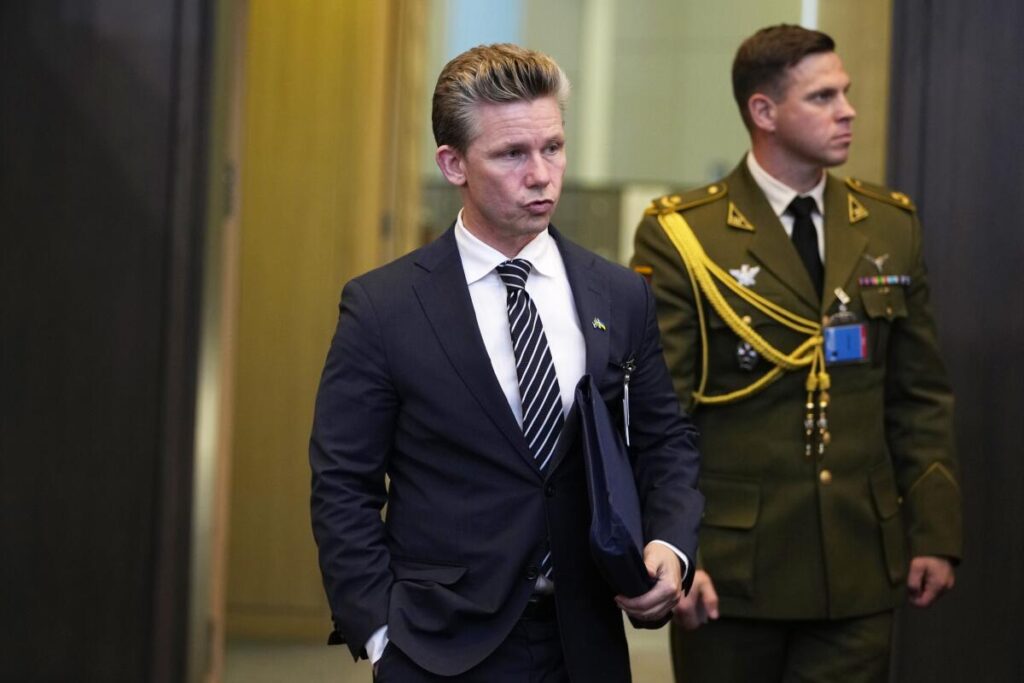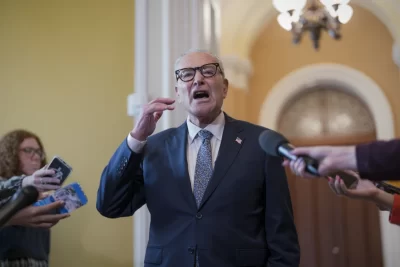
NATO Secretary-General Jens Stoltenberg on Thursday pressed Turkey to quickly ratify Sweden’s membership in the military organization, three months after President Recep Tayyip Erdogan said he would help hasten the process in the Turkish parliament.
“Many allies would like to see speedy progress on this ratification,” Stoltenberg told The Associated Press after chairing a meeting of NATO defense ministers in Brussels. “Sweden has delivered on what they promised, and now we need the ratification of Swedish membership.”
Sweden and its neighbor Finland turned their backs on decades of military non-alignment after President Vladimir Putin ordered Russia troops to invade Ukraine in February 2022. Their aim was to seek protection under NATO’s security umbrella, and Finland joined in April.
All 31 NATO allies must endorse Sweden’s membership. Turkey and Hungary are dragging their feet. Erdogan spent months publicly saying he was withholding his country’s approval because he believed that Sweden had been too soft on Kurdish militants and other groups that he considers to be security threats. Many allies doubted that.
Turkey also was angered by a series of Quran-burning protests in Sweden.
Stoltenberg said he welcomed a commitment Turkish Defense Minister Yasar Guler made during Thursday’s meeting which “made it clear that Turkey would stand by the agreement.” But it remains unclear when Ankara will do so.
Erdogan dropped his opposition in July after the Biden administration signaled it would let Turkey buy 40 new F-16 fighter jets and modernization kits from the United States. Ankara also received assurances from Sweden that it would help revive Turkey’s own quest to join the European Union.
Under the deal, NATO as an organization agreed to address Turkey’s concerns about terrorism. Stoltenberg said Thursday that he had appointed Assistant Secretary General Tom Goffus will serve as his special coordinator for counter-terrorism.
“It demonstrates that NATO, Sweden, we have delivered on the agreement from Vilnius, and now we should also see that Turkey ratifies the Swedish accession,” Stoltenberg said.
It had been hoped that the long-awaited ratification would come soon after Oct. 1, when Turkey’s parliament resumed work following a summer recess. But on the same day, a suicide bomber blew himself up outside the interior ministry in Ankara. Another would-be bomber was killed in a shootout with police. Two officers were wounded.
The attack prompted Turkey to mount airstrikes against suspected Kurdish militant sites in northern Iraq, against Syrian Kurdish militia in Syria, and to launch a series of raids across Turkey in which dozens of people with suspected links to the Kurdish militants were rounded up.
Hungary’s objections are not entirely clear. Prime Minister Viktor Orban has repeatedly said that his country would not be the last to endorse Sweden’s membership. That stance has left Stockholm and some allies perplexed, as no public demands have been made to win his approval.
Some vague allusions have surfaced. Orban’s government has alleged that Swedish politicians have told “blatant lies” about the state of Hungary’s democracy and that this has left some lawmakers unsure about whether to support the accession bid.
Last month, Orban said he was in no hurry. He told lawmakers that “nothing is threatening Sweden’s security,” and that Hungary was therefore in “no rush” to ratify its membership.
“I haven’t heard anything new about that from the Hungarian side,” Stoltenberg told the AP.
___
Suzan Fraser in Ankara contributed.




